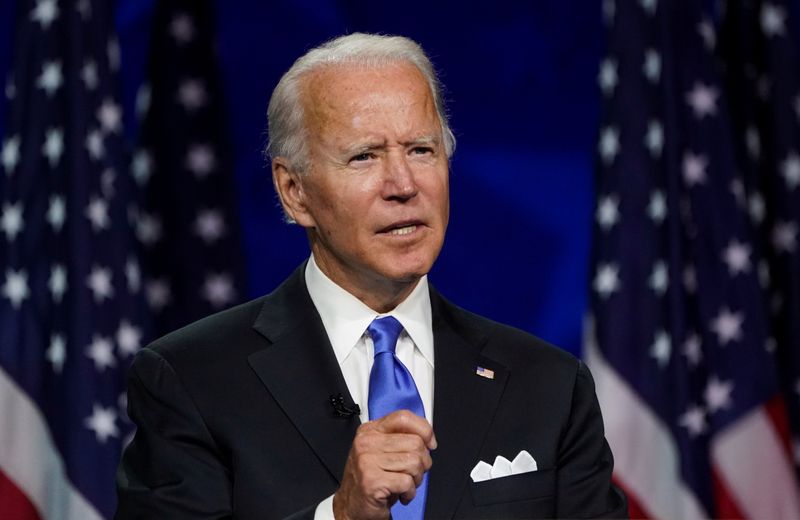By James Oliphant
WASHINGTON (Reuters) - Joe Biden finally got his moment.
After a 2020 presidential campaign dominated by President Donald Trump's words and actions, Biden on Thursday rose to the level of a true adversary as he accepted the Democratic Party's nomination for the November election.
Accused by the Republican Trump of hiding in his basement throughout the coronavirus pandemic, Biden turned his opponent's narrative to his advantage on the final night of the Democratic National Convention, delivering an austere address in a quiet room that some commentators, both left and right, likened to a speech from the Oval Office, not a convention floor.
Biden, 77 and nearing his 50th year in politics, cast himself as the wizened healer of a troubled and divided nation, pushing back at doubters within his party who whispered that he was wrong for the moment. He invoked President Franklin Delano Roosevelt, who presided over a nation beset by economic hardship and then war.
A day after former President Barack Obama warned that Trump posed a threat to democracy, Biden, who was Obama's vice president, offered Americans an alternative, pledging to be “an ally of the light, not the darkness" if elected.
Biden’s remarks were in sync with a compressed, virtual Democratic convention that focused less on policy priorities and more on casting as wide a net as possible to assemble a coalition to win.
The online format allowed the party to feature an array of progressive Democrats and disenchanted Republicans over four nights of programming, while papering over the fissures from a divisive primary that tested how far left it was ready to move.
The two most beloved figures in the party, Barack and his wife Michelle Obama, savaged Trump in their respective convention speeches. That left Biden and his running mate, U.S. Senator Kamala Harris, the room to outline a more ambitious vision beyond merely defeating the president.
'HOPE AND LIGHT'
Leaning into the themes of unity, character and decency emphasized throughout the convention, Biden said the country could choose a different, less angry, way forward.
"A path of hope and light," he said.
The speech afforded him the opportunity to promise to be more than a custodian of Obama’s legacy, a charge that has followed him throughout his presidential bid.
Robert Shrum, who managed John Kerry’s 2004 presidential campaign, said the site of the address, a near-empty hotel ballroom in Delaware made necessary because of the pandemic, worked to Biden’s benefit.
“It felt more presidential,” Shrum said. “A lot of people mocked him for being ‘Biden in the basement.’ He learned how to deal with this virtual reality. Tonight, he handled it brilliantly.”
Some high-profile Republicans were equally impressed.
Karl Rove, White House deputy chief of staff to former President George W. Bush, called it "a very good speech," telling Fox News that Biden effectively portrayed himself as a unifier who would bring the country together.
He said Biden's message should worry Republican strategists in the Trump campaign if it resonated with swing voters.
While basking in accolades, Biden faces potential factors well outside his campaign's control, including efforts by Republicans to curtail voting amid the pandemic and concerns about the U.S. Postal Service's capacity to handle a flood of mail-in ballots.
Trump, who was watching on Thursday and denigrated Biden on Twitter as an ineffective Washington lifer, will have his turn next week when Republicans hold their virtual convention. He is expected to accept the nomination at the White House, a backdrop with which Biden cannot compete.
While Trump, 74, has ramped up his campaign travel, including trips this week to several battleground states, Biden remains more cautious.
Biden's travel is expected to remain severely limited given that his campaign has decided to defer to public health experts during the outbreak, and Democrats will focus largely on online get-out-the-vote efforts.
That made Biden’s speech on Thursday in front of a national audience that much more crucial. He may have few chances to detail the vision of his candidacy again before so many voters.
But Joe Trippi, a veteran Democratic consultant, said it may not be necessary. The election in its final weeks ultimately will hinge on how voters view Trump’s performance in office, Trippi said.

“This is and will be a referendum on Trump,” Trippi said. “And Joe Biden not only doesn’t need to change that - he can’t.”
